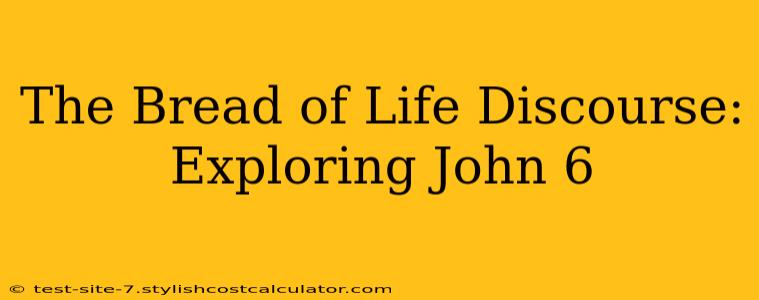John 6, often referred to as the Bread of Life Discourse, is a pivotal passage in the Gospel of John, rich in theological depth and metaphorical meaning. This discourse, centered around Jesus's miraculous feeding of the five thousand and his subsequent teaching, profoundly reveals Jesus's identity as the Messiah and the source of eternal life. Understanding its nuances requires careful consideration of its context, its imagery, and its implications for believers.
What is the Bread of Life Discourse in John 6?
The Bread of Life Discourse (John 6:22-71) begins with the aftermath of Jesus miraculously feeding a multitude with just a few loaves and fishes. This miraculous event becomes the springboard for Jesus's teaching about himself as the "bread of life." He uses this powerful image of sustenance to unveil his role as the provider of spiritual nourishment and eternal life, contrasting earthly food with the life-giving sustenance he offers. The discourse culminates in a profound declaration: believing in Jesus is essential for receiving this eternal life.
What does Jesus mean by "I am the bread of life"?
Jesus's statement, "I am the bread of life" (John 6:35), is not a literal claim to be bread. It's a profound metaphorical statement rooted in Jewish tradition. The manna in the desert, which sustained the Israelites during their exodus from Egypt, served as a type or foreshadowing of Christ. Jesus, as the true bread from heaven, provides spiritual sustenance – far surpassing the temporary physical needs met by the manna. This sustenance leads to eternal life, a spiritual reality far beyond the limitations of earthly existence.
What is the significance of the miracle of the loaves and fishes in John 6?
The miracle of the loaves and fishes isn't merely a display of Jesus's power; it's a powerful symbol. It prefigures the abundance of spiritual blessings available through faith in Christ. The multiplication of the bread and fish foreshadows the abundance of spiritual nourishment Christ offers – an abundance that satisfies the deepest hunger of the human soul. The miracle provides a tangible connection to the spiritual teaching that follows.
How does the Bread of Life Discourse relate to the Eucharist?
The Bread of Life Discourse has long been interpreted as a foundational text for understanding the Eucharist (Holy Communion). Many Christians see a direct connection between Jesus's words about his flesh and blood being the true food and drink giving eternal life, and the practice of receiving bread and wine as symbolic representations of Christ's body and blood. However, it's important to note that interpretations vary among different Christian denominations.
Who are the people who followed Jesus after the feeding of the 5,000?
After the miracle of the feeding of the five thousand, many people followed Jesus, drawn to him by the miraculous event and his teaching. However, John's Gospel emphasizes that not all of these followers truly understood or accepted Jesus's teachings. The discourse reveals the importance of genuine faith and understanding, highlighting the distinction between temporary, superficial following and a deep, committed discipleship rooted in faith.
What does it mean to eat the flesh and drink the blood of Jesus?
The statement, "Unless you eat the flesh of the Son of Man and drink his blood, you have no life in you" (John 6:53), is often considered the most challenging part of the discourse. It's crucial to understand this metaphorically. It speaks to a deep, intimate relationship with Christ, a complete surrender and dependence on him for spiritual nourishment and life. It's about receiving the totality of his person—his teachings, his sacrifice, his very being—into one's life. It isn't a literal cannibalistic act but a spiritual communion.
Conclusion:
The Bread of Life Discourse in John 6 is a multifaceted and profound passage that reveals Jesus's identity as the provider of spiritual life. It uses vivid imagery and powerful metaphors to convey the depth of his love and the transformative power of faith. The discourse calls for a deep understanding of Christ’s role as the ultimate source of spiritual nourishment and eternal life, urging believers towards a life fully surrendered to him. Its rich theological implications continue to inspire and challenge Christians centuries later.

